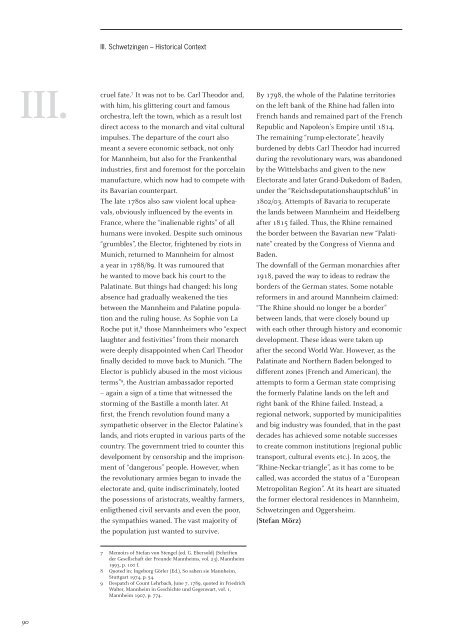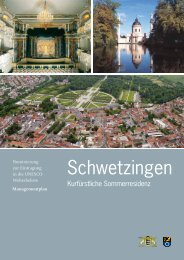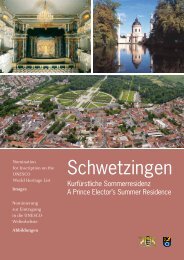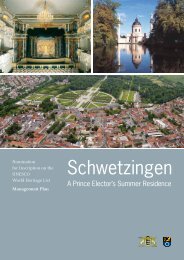II. - Schloss Schwetzingen
II. - Schloss Schwetzingen
II. - Schloss Schwetzingen
Create successful ePaper yourself
Turn your PDF publications into a flip-book with our unique Google optimized e-Paper software.
<strong>II</strong>I.<br />
90<br />
<strong>II</strong>I. <strong>Schwetzingen</strong> – Historical Context<br />
cruel fate. 7 It was not to be. Carl Theodor and,<br />
with him, his glittering court and famous<br />
orchestra, left the town, which as a result lost<br />
direct access to the monarch and vital cultural<br />
impulses. The departure of the court also<br />
meant a severe economic setback, not only<br />
for Mannheim, but also for the Frankenthal<br />
industries, fi rst and foremost for the porcelain<br />
manufacture, which now had to compete with<br />
its Bavarian counterpart.<br />
The late 1780s also saw violent local upheavals,<br />
obviously infl uenced by the events in<br />
France, where the “inalienable rights” of all<br />
humans were invoked. Despite such ominous<br />
“grumbles”, the Elector, frightened by riots in<br />
Munich, returned to Mannheim for almost<br />
a year in 1788/89. It was rumoured that<br />
he wanted to move back his court to the<br />
Palatinate. But things had changed: his long<br />
absence had gradually weakened the ties<br />
between the Mannheim and Palatine population<br />
and the ruling house. As Sophie von La<br />
Roche put it, 8 those Mannheimers who “expect<br />
laughter and festivities” from their monarch<br />
were deeply disappointed when Carl Theodor<br />
fi nally decided to move back to Munich. “The<br />
Elector is publicly abused in the most vicious<br />
terms” 9 , the Austrian ambassador reported<br />
-- again a sign of a time that witnessed the<br />
storming of the Bastille a month later. At<br />
fi rst, the French revolution found many a<br />
sympathetic observer in the Elector Palatine’s<br />
lands, and riots erupted in various parts of the<br />
country. The government tried to counter this<br />
develpoment by censorship and the imprisonment<br />
of “dangerous” people. However, when<br />
the revolutionary armies began to invade the<br />
electorate and, quite indiscriminately, looted<br />
the posessions of aristocrats, wealthy farmers,<br />
enligthened civil servants and even the poor,<br />
the sympathies waned. The vast majority of<br />
the population just wanted to survive.<br />
7 Memoirs of Stefan von Stengel (ed. G. Ebersold) (Schriften<br />
der Gesellschaft der Freunde Mannheims, vol. 23), Mannheim<br />
1993, p. 100 f.<br />
8 Quoted in: Ingeborg Görler (Ed.), So sahen sie Mannheim,<br />
Stuttgart 1974, p. 54.<br />
9 Despatch of Count Lehrbach, June 7, 1789, quoted in Friedrich<br />
Walter, Mannheim in Geschichte und Gegenwart, vol. 1,<br />
Mannheim 1907, p. 774.<br />
By 1798, the whole of the Palatine territories<br />
on the left bank of the Rhine had fallen into<br />
French hands and remained part of the French<br />
Republic and Napoleon’s Empire until 1814.<br />
The remaining “rump-electorate”, heavily<br />
burdened by debts Carl Theodor had incurred<br />
during the revolutionary wars, was abandoned<br />
by the Wittelsbachs and given to the new<br />
Electorate and later Grand-Dukedom of Baden,<br />
under the “Reichsdeputationshauptschluß” in<br />
1802/03. Attempts of Bavaria to recuperate<br />
the lands between Mannheim and Heidelberg<br />
after 1815 failed. Thus, the Rhine remained<br />
the border between the Bavarian new “Palatinate”<br />
created by the Congress of Vienna and<br />
Baden.<br />
The downfall of the German monarchies after<br />
1918, paved the way to ideas to redraw the<br />
borders of the German states. Some notable<br />
reformers in and around Mannheim claimed:<br />
“The Rhine should no longer be a border”<br />
between lands, that were closely bound up<br />
with each other through history and economic<br />
development. These ideas were taken up<br />
after the second World War. However, as the<br />
Palatinate and Northern Baden belonged to<br />
different zones (French and American), the<br />
attempts to form a German state comprising<br />
the formerly Palatine lands on the left and<br />
right bank of the Rhine failed. Instead, a<br />
regional network, supported by municipalities<br />
and big industry was founded, that in the past<br />
decades has achieved some notable successes<br />
to create common institutions (regional public<br />
transport, cultural events etc.). In 2005, the<br />
“Rhine-Neckar-triangle”, as it has come to be<br />
called, was accorded the status of a “European<br />
Metropolitan Region”. At its heart are situated<br />
the former electoral residences in Mannheim,<br />
<strong>Schwetzingen</strong> and Oggersheim.<br />
(Stefan Mörz)






